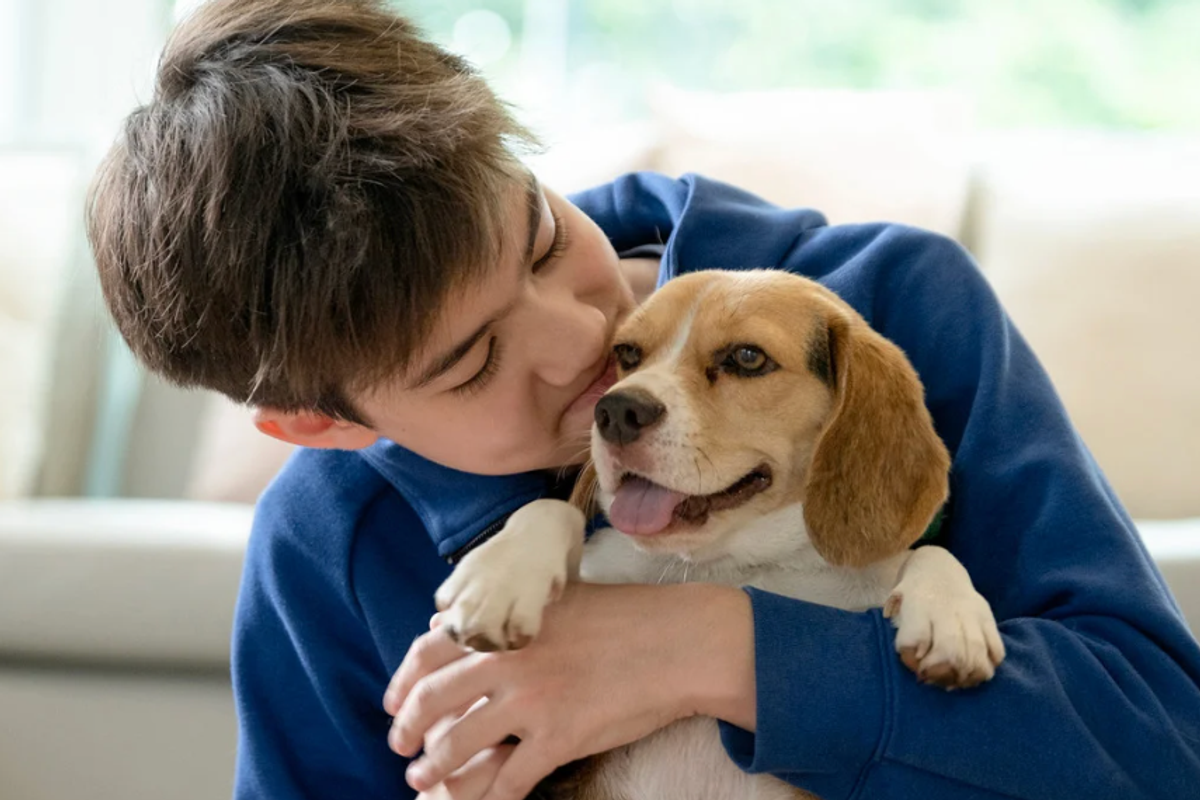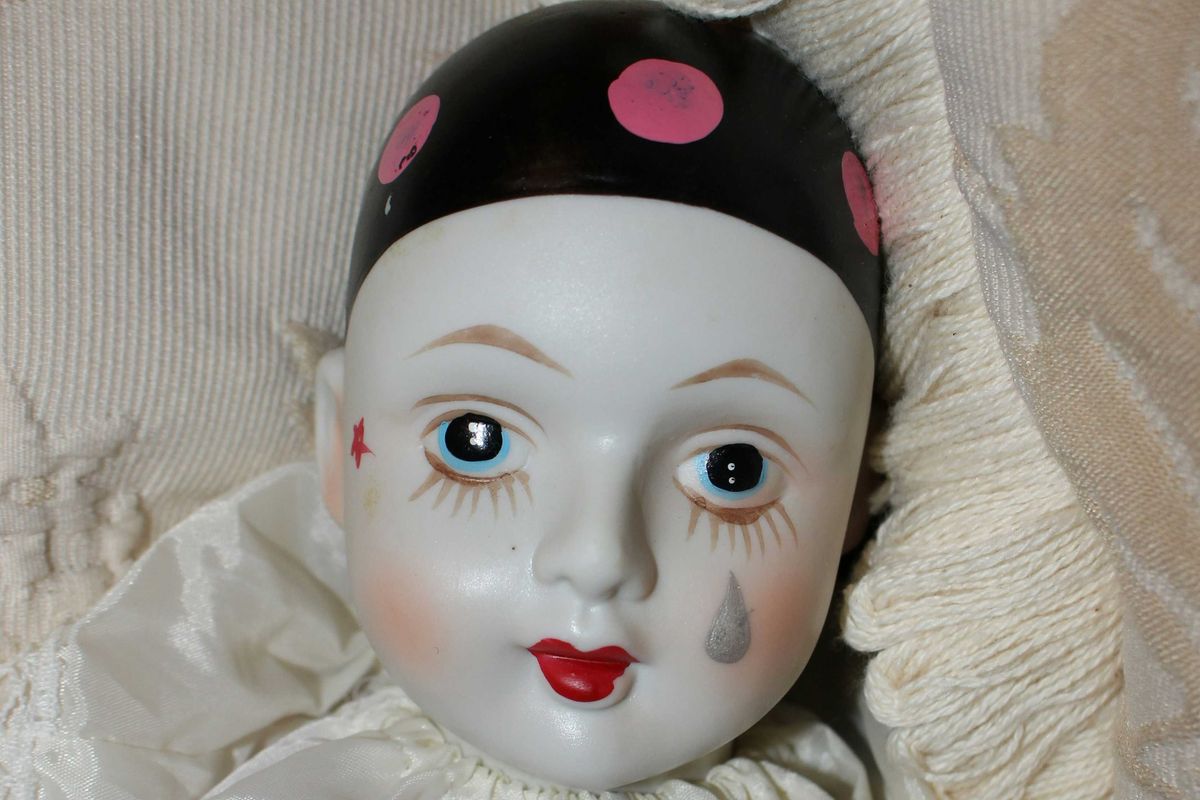This is Laith. He's 6 years old and currently lives in the Idomeni refugee camp in Greece.
Laith, age 6. Photo via YouTube/Ignite Channel.
Laith was shot by the same bullet that killed his dad and uncle while they were riding on a motorcycle. The bullet ripped through his leg and makes it hard for him to walk.
Although doctors are present at the Idomeni refugee camps, they are stretched so thin that Laith and his family have to wait in line for up to two days just to redress his wound.
And that's where volunteers like Ayesha Sayed come in.
Most people spend their vacation time catching up on sleep and binge-watching crime shows. Not Ayesha Sayed.
Ayesha co-runs three companies in Dubai, one of which sells medical supplies, and she spends what little free time she has volunteering and helping others. Her big warm smile is a brief window into her genuine spirit, and her neon green hair probably makes her fit right in at the Burning Man festival she regularly attends.
Ayesha Sayed (left) with fellow volunteers Duane Heil and Chris Morrow. Photo by Alison Thompson, used with permission.
Last October, Ayesha travelled to Lesbos, Greece, with a suitcase full of supplies from her medical supply store and spent a week helping with medical needs and translation.
"I've wanted to go back [to Greece] since October, but there was just too much to do here [in Dubai]," she told Upworthy.
In March 2016, Ayesha took some time off work and went back to Greece, this time to a tiny village called Idomeni, where she met Laith and his family.
If the Syrian refugee crisis is a hurricane, Idomeni is the levee — barely hanging on and threatening to buckle.
Photo by Matt Cardy/Getty Images.
Last month, the Balkan route (a passage from Greece north to countries like Macedonia, Serbia, and Germany) was permanently shut down. Macedonia, Slovenia, and Serbia slammed their borders closed, leaving thousands without a place to go and many more on the way.
Currently, there are as many as 14,000 immigrants stuck in Idomeni — many of them children.
"I think that was the most surprising thing," Ayesha recalls. "Children from 0 to 5 are everywhere."
Photo by Matt Cardy/Getty Images.
Conditions at the border camp in Idomeni are squalid. The constant flow of refugees entering Greece without a place to go has created a humanitarian nightmare that is both festering and steadily growing.
"There's no electricity, there’s not a lot of clean water, and no sanitation whatsoever," Ayesha explains. "Everybody’s sick because of the horrible hygiene and the children not having enough nutrition. They get one meal a day which is not really good."
Though Ayesha had seen the refugee crisis firsthand in Lesbos, she was completely overwhelmed by the conditions in Idomeni.
"People who got to Lesbos were just happy that they made it to Europe after the really really long journey," she says. "[In Idomeni] it was utter and complete despair. People had been stuck at the border for 40 days by the time we arrived. Nobody knew anything about what was going to happen; nobody was saying anything."
It's so bad there, in fact, that Greece recently had to send over 200 migrants back to Turkey as part of a controversial "one in, one out" deal struck between the European Union and Turkey last month. Under the deal, anyone who migrates to Greece illegally from now on will be sent back to Turkey in exchange for a vetted refugee.
A ferry arriving on April 4, 2016. to deport migrants from Greece to Turkey. Photo by Ozan Kose/AFP/Getty Images.
But the day-to-day workings of that deal remain unclear for those on the ground.
"There's no clarity," says Ayesha. "There would always be these rumors about how — now that the EU has signed a deal with Turkey — everyone is going to be sent back to Turkey. All [the refugees] want is the most basic things, and it's really difficult to hear that from a couple thousand people and then have no answer for them."
Amid the chaos, confusion, and despair, Ayesha worked with kids whose dire situation cemented her resolution to press forward.
Kids like 6-year-old Laith, whose bullet wound needed medical attention faster than doctors at the camp could respond.
"Laith we found through his mom who came to us because he had severe pain," Ayesha says. "She thought that his bullet wound was infected. So we did the redressing."
There are also kids like Noor, age 2, who has an unidentified birth defect, but was turned away from the camp's medical facilities because her paperwork (including MRI scans and basic medical records) were lost at sea.
Noor, age 2. Photo by Ayesha Sayed. Used with permission.
"She’s extremely sick," Ayesha says of Noor, who needs several surgeries on her head and umbilical cord. "They tried to find someone in Syria but all the pediatric brain surgeons have left. There’s none of them left in Syria."
Then, there was Lava, age 16, who Ayesha says has trouble speaking and a lot of anxiety.
"She tried to kill herself a couple times because, just the whole journey was really really stressful for her," Ayesha says.
These are just three of many kids in the camp who need medical care that can't be provided by the few doctors and volunteers present.
"I think all the NGOs are so overwhelmed that they can’t really focus on individual cases," Ayesha says.
Working with the kids in the camp showed Ayesha just how much help and hope one person's efforts can bring.
"There's always hope," Ayesha says, though she quickly points out that hope comes from action.
Photo from Ayesha Sayed, used with permission.
"90% of people who I’ve spoken to either believe that the military is going to do something about it or some NGO is going to do something about it." Ayesha says. "Somebody else, but not them. "
While we can't all get on planes with medical supplies the way Ayesha did, there are still ways to help.
In America, the situation in Greece can seem like a faraway crisis brought up in talking points at political debates. It becomes too easy to forget about the people who wake up every single day in those camps with little to eat and no new information about what lies ahead of them. We all have the ability to help those people.
Ayesha suggests doing a donation drive or sponsoring a refugee child.
Photo by Alison Thompson. Used with permission.
She also started a website called "Refugee Heroes," where anyone can find out about the need for basic supplies in Greece and provide what they can or connect with other NGOs and individuals who are helping on the ground.
"We obviously can't help everybody. But everybody can do a little bit to help."



 Each of those arms has its own brain?
Each of those arms has its own brain?
 Homemade granola bars with chocolate chips – perfect for a delicious snack!
Homemade granola bars with chocolate chips – perfect for a delicious snack! Refresh with a healthy green juice boost.
Refresh with a healthy green juice boost. Making fresh orange juice in the kitchen. 🍊
Making fresh orange juice in the kitchen. 🍊 Be careful with supplements.
Be careful with supplements.
 A man being licked by a golden retreiver.
A man being licked by a golden retreiver.  A dog's tongue close-up.
A dog's tongue close-up.  A golden retreiver getting their teeth brushed.
A golden retreiver getting their teeth brushed. 
 A white porcelain doll with a tear stain. Photo by
A white porcelain doll with a tear stain. Photo by 